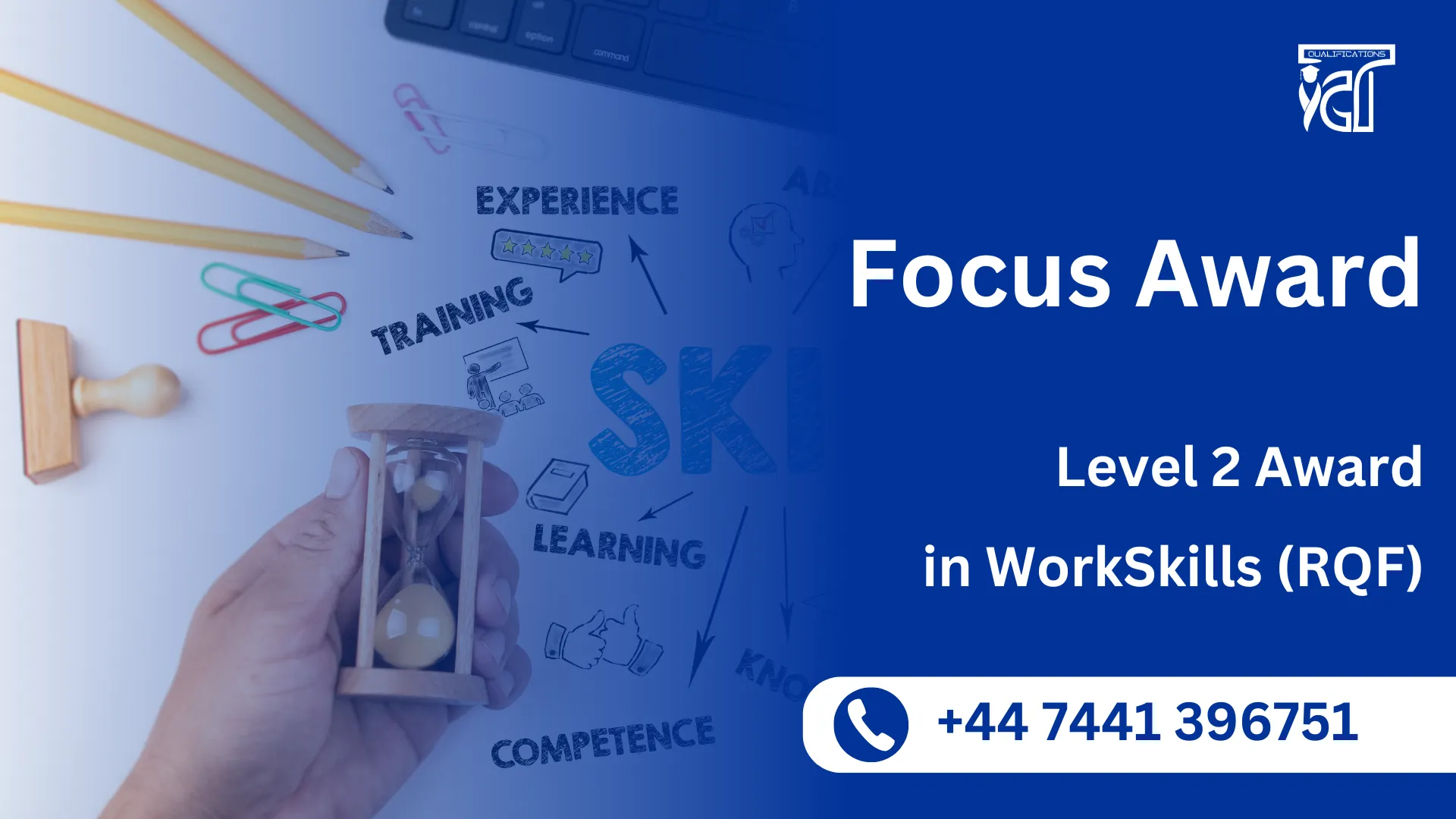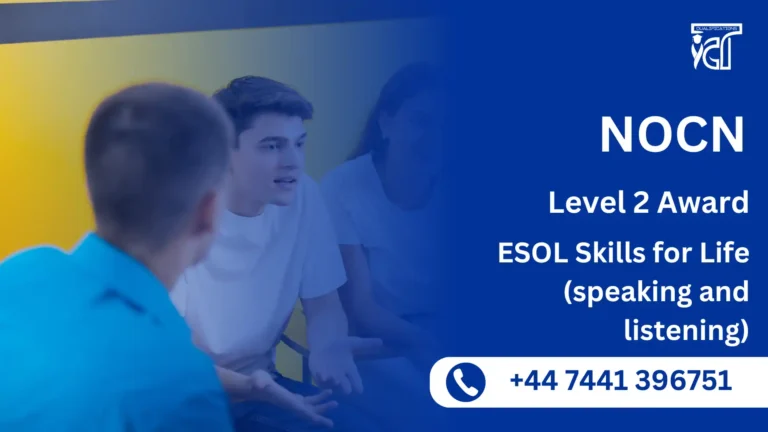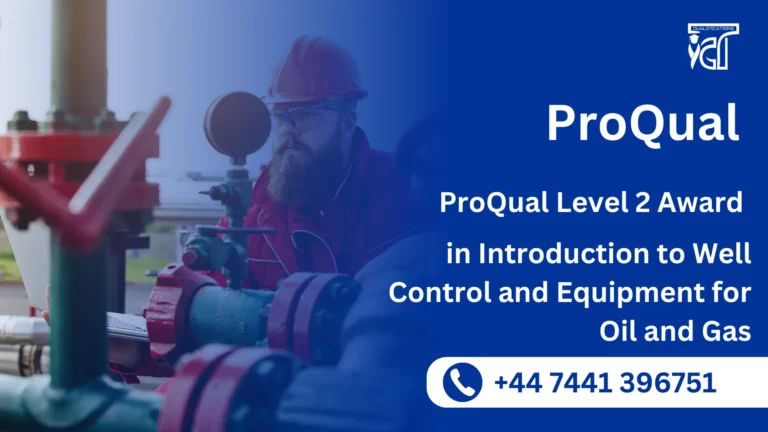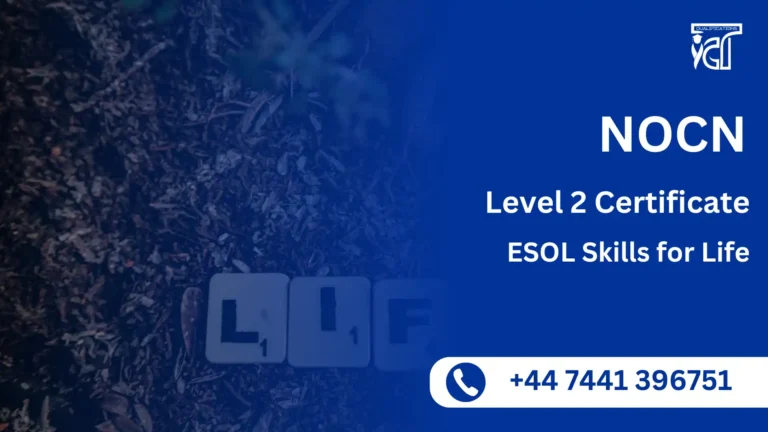In today’s competitive job market, acquiring the right set of workplace skills is crucial to standing out to potential employers. Whether you’re starting your career or looking to improve your employability, the Focus Awards Level 2 Award in WorkSkills (RQF) offers a comprehensive and effective way to boost your career prospects. This nationally recognized qualification helps you develop essential skills for success in any workplace.
The Focus Awards Level 2 Award in WorkSkills (RQF) is a regulated qualification designed to provide learners with the necessary skills to thrive in the workplace. This course focuses on practical, hands-on work-related skills that employers value the most, such as communication, time management, teamwork, and problem-solving. It is perfect for individuals who want to enhance their job readiness, whether they are entering the workforce for the first time or aiming to improve their current career prospects.
This qualification is part of the Regulated Qualifications Framework (RQF), ensuring that it adheres to high standards set by the UK government and is recognized by employers both nationally and internationally.
The course equips learners with core work skills like communication, team collaboration, and time management that are required in any job role. These skills will significantly enhance your ability to perform effectively and excel in the workplace.As an Ofqual-regulated qualification, this course is recognized and respected by employers, educational institutions, and regulatory bodies across the UK. It provides you with a credible certification that can be used to validate your skills and knowledge.
The Focus Awards Level 2 Award in WorkSkills (RQF) is an essential qualification for anyone looking to enhance their employability and succeed in the workplace. Whether you are a school leaver, re-entering the workforce, or looking to improve your career prospects, this course provides a comprehensive foundation in the core skills employers seek. With its flexible, assignment-based learning format and Ofqual-regulated status, this qualification is recognized across the UK and internationally, offering you the tools you need to succeed in the job market.
Ready to take the first step towards career success? Enroll in the Focus Awards Level 2 Award in WorkSkills (RQF) and unlock your full potential today!
Focus Awards Level 2 Award in WorkSkills (RQF)
The Focus Awards Level 2 Award in WorkSkills (RQF) qualification consists of Total Qualification Time (TQT): 60, Guided Learning Hours (GLH): 30 and Credits : 6 for the completed qualification. Learners must achieve 2 credits from the Optional Group 1 and 1 credit from either the Optional Group 1 or optional Group 2 totalling 3 credits.
| Sr# | Unit Title | Credit | GLH |
|---|---|---|---|
| 1 | Preparing for an interview | 1 | 10 |
| 2 | Interview skills | 1 | 10 |
| 3 | Self-assessment | 2 | 10 |
| 4 | Effectiveness at work | 1 | 10 |
| 5 | Working in a team | 3 | 30 |
| 6 | Investigating rights and responsibilities at work | 1 | 10 |
GLH (Guided Learning Hours) and TQT (Total Qualification Time) are terms commonly used in vocational qualifications to help define the amount of time a learner is expected to spend on their studies.
1. GLH (Guided Learning Hours)
GLH refers to the number of hours a learner spends being directly taught, supervised, or supported during their course. This includes the time spent in activities such as:
- Classroom instruction
- Practical workshops
- One-on-one tutoring or mentoring sessions
- Online learning sessions with tutor support
In other words, GLH represents the time that learners are actively engaged with their instructors or learning activities.
2. TQT (Total Qualification Time)
TQT represents the total amount of time a learner is expected to invest in completing a qualification, including:
- GLH (Guided Learning Hours): Time spent on direct learning, as explained above.
- Self-Directed Learning: This includes time spent on independent study, research, assignment completion, preparation for exams, and any other work the learner does outside of direct teaching hours.
TQT is a broader measure that includes all the time required to achieve the qualification. It helps learners and employers understand the overall commitment required for the qualification.
Key Differences Between GLH and TQT:
- GLH focuses on direct learning with guidance or supervision.
- TQT includes GLH as well as independent study time and other learning-related activities.
Example:
If a qualification has a TQT of 600 hours and a GLH of 250 hours, it means the learner should spend 250 hours in direct learning (classroom, online, or tutor-led sessions) and 350 hours on independent study or research.
Learning Outcomes for Focus Awards Level 2 Award in WorkSkills (RQF):
1. Self-management Skills
- Understand and demonstrate effective personal time management.
- Develop strategies to improve personal efficiency and task prioritization.
- Enhance self-discipline and motivation in the workplace.
2. Developing Personal Skills for Leadership
- Develop key leadership skills to motivate and guide others in the workplace.
- Understand the principles of leadership and how they can be applied in different work contexts.
- Demonstrate leadership qualities when interacting with others.
3. Contributing to Meetings
- Understand the purpose of meetings and the role of a participant.
- Develop communication and listening skills for effective meeting participation.
- Contribute relevant ideas and feedback in group settings.
4. Managing Your Own Money
- Understand personal budgeting and money management techniques.
- Develop skills to make informed financial decisions in personal and work settings.
5. Learning from More Experienced People
- Identify key learning opportunities from mentors and experienced professionals.
- Understand the benefits of seeking guidance from others in the workplace.
- Develop strategies to implement feedback and advice effectively.
6. Self-assessment
- Perform self-reflection to identify strengths and areas for improvement.
- Set personal goals for skill development and career progression.
- Understand how to assess personal performance and make necessary adjustments.
7. Practising Leadership Skills with Others
- Demonstrate leadership skills when working with others.
- Practice managing and supporting teams or colleagues.
- Understand the importance of clear communication and decision-making in leadership roles.
8. Preparing for Work Placement
- Understand the key skills required for a successful work placement.
- Develop strategies for adapting to new work environments.
- Learn how to behave professionally and meet workplace expectations.
9. Searching for a Job
- Develop strategies for effective job search.
- Create tailored CVs and cover letters for different job roles.
- Learn how to use online job platforms and networking to find opportunities.
10. Building Working Relationships with Colleagues
- Understand the importance of communication and collaboration in the workplace.
- Develop positive relationships with coworkers to enhance team productivity.
- Resolve conflicts and challenges effectively to maintain a harmonious work environment.
11. Managing Your Health at Work
- Understand the importance of health and well-being in the workplace.
- Develop strategies to manage work-related stress and maintain a healthy work-life balance.
- Implement workplace health and safety procedures effectively.
12. Career Progression
- Set career goals and develop a plan to achieve long-term career progression.
- Understand the importance of continuous professional development.
- Learn how to identify opportunities for career advancement within an organization.
13. Learning with Colleagues and Other Learners
- Collaborate with peers to enhance learning outcomes.
- Understand the value of group learning and knowledge sharing in a workplace context.
- Develop skills to contribute to a positive and productive learning environment.
14. Applying for a Job
- Understand the process of applying for jobs, including submitting applications and attending interviews.
- Develop strategies to highlight skills and experience effectively to potential employers.
- Learn how to tailor job applications to different job roles and industries.
15. Building Working Relationships with Customers
- Understand the principles of customer service and relationship-building.
- Develop skills to communicate effectively with customers and provide exceptional service.
- Resolve customer complaints and issues professionally and promptly.
16. Setting and Meeting Targets at Work
- Learn how to set realistic and achievable work targets.
- Understand how to monitor progress and adjust actions to meet deadlines.
- Develop time-management techniques to stay on track and achieve work objectives.
17. Communicating Solutions to Others
- Develop skills to communicate effectively when presenting solutions to workplace issues.
- Use clear and concise language to explain ideas and solutions.
- Understand how to adapt communication styles for different audiences.
18. Learning from Work Placement
- Reflect on learning experiences gained from work placements.
- Develop strategies for transferring skills and knowledge learned in the workplace to future opportunities.
- Understand the value of work placements in enhancing employability.
19. Producing a Product
- Understand the steps involved in producing a product or service within a work context.
- Develop problem-solving and project management skills to complete product-related tasks.
- Ensure the quality and standards of products meet workplace expectations.
20. Preparing for an Interview
- Develop strategies for effective interview preparation.
- Understand common interview questions and how to answer them confidently.
- Demonstrate professionalism and self-assurance in a job interview setting.
21. Investigating Rights and Responsibilities at Work
- Understand the rights and responsibilities of employees and employers in the workplace.
- Learn about employment laws and regulations that affect your role and workplace.
- Develop the skills to advocate for your rights and understand your obligations at work.
22. Solving Work-related Problems
- Develop critical thinking and problem-solving skills to address challenges in the workplace.
- Learn to approach problems systematically and find effective solutions.
- Collaborate with others to solve issues and improve workplace practices.
23. Alternatives to Paid Work
- Understand the different types of alternative work options, including volunteering and internships.
- Evaluate the benefits of unpaid work in gaining skills and experience.
- Explore career options outside of traditional full-time paid employment.
24. Effectiveness at Work
- Learn how to perform tasks efficiently and effectively in a work environment.
- Understand the factors that contribute to high levels of productivity and job satisfaction.
- Develop strategies to improve personal and team effectiveness.
25. Planning an Enterprise Activity
- Understand the key elements involved in planning an enterprise activity or project.
- Develop skills in setting goals, allocating resources, and managing risks.
- Plan and implement an enterprise project from start to finish.
26. Interview Skills
- Learn techniques for excelling in job interviews.
- Develop strategies for answering behavioral and situational interview questions.
- Understand the importance of body language, tone, and presentation during an interview.
27. Summarising Documents
- Develop skills to summarize and interpret key points from documents.
- Learn how to extract important information and present it concisely and clearly.
- Understand the role of document summarization in improving work efficiency.
28. Working as a Volunteer
- Understand the benefits of volunteering and its impact on career development.
- Learn how to develop transferable skills through volunteer work.
- Demonstrate professionalism and responsibility in volunteer roles.
29. Working in a Team
- Learn the dynamics of effective teamwork and collaboration.
- Develop communication and problem-solving skills for working in a team.
- Contribute to achieving team goals and managing group tasks efficiently.
Benefits of the Focus Awards Level 2 Award in WorkSkills (RQF)
The Focus Awards Level 2 Award in WorkSkills (RQF) is a highly regarded qualification designed to equip individuals with essential workplace skills. Whether you’re entering the job market or looking to enhance your current employability, this course offers numerous benefits that will help you thrive in any professional setting. Here are some key benefits of completing this course:
1. Develop Essential Work Skills
The course focuses on core work-related skills such as time management, teamwork, communication, and problem-solving, which are highly valued by employers. By developing these skills, you will be better prepared to meet the challenges of the modern workplace and excel in any job role.
2. Improved Employability
With the Focus Awards Level 2 Award in WorkSkills (RQF), you’ll gain practical and transferable skills that are applicable in a wide range of industries. This qualification will enhance your CV and help you stand out to employers, improving your chances of securing employment, whether you’re seeking your first job or looking to change careers.
3. Ofqual-Regulated and Widely Recognized Qualification
As an Ofqual-regulated qualification, this course adheres to high standards set by the UK government, ensuring that your certification is recognized and respected across the UK and internationally. It will provide you with a credible qualification that employers trust.
4. Flexible Learning
The course offers flexible, assignment-based learning, which means you can study at your own pace. Whether you’re balancing work, other commitments, or prefer learning independently, this flexible format allows you to tailor your learning experience to suit your schedule and lifestyle.
5. Enhance Confidence and Professionalism
By working through real-world scenarios, case studies, and assignments, you’ll gain the confidence to apply professional skills in your job role. You’ll learn to manage tasks effectively, communicate confidently, and solve workplace problems, which will enhance your overall professionalism.
6. Practical Experience for Career Growth
The course includes practical modules that teach you how to develop key work skills that employers are actively seeking. This includes everything from self-management and interpersonal communication to problem-solving and team collaboration, ensuring you’re job-ready from day one.
7. Boosts Career Progression
Completing this course provides a solid foundation for further study or career development. Whether you decide to pursue higher qualifications, specialized training, or seek career advancement, this qualification demonstrates to employers that you are committed to professional growth.
8. Transferable Skills Across Various Sectors
The skills learned in this course can be applied across various sectors, including retail, customer service, administration, healthcare, and hospitality. This makes it a great choice for anyone looking to enter or switch between different industries.
9. Learning from Experienced Professionals
By undertaking this qualification, you’ll have the opportunity to learn from experienced educators and professionals in the field. This can provide valuable insights into workplace practices and prepare you to enter a work environment with confidence.
10. Global Recognition
The RQF qualification framework ensures that your Focus Awards Level 2 Award in WorkSkills is recognized not just within the UK but internationally, offering you career opportunities abroad.
11. Hands-On Experience Through Assignments
Since the qualification is entirely assignment-based, you will gain hands-on experience that is immediately applicable in the workplace. This practical approach allows you to apply what you’ve learned directly to real-world situations, making you more effective in your job role.
12. Positive Impact on Personal and Professional Life
The course doesn’t just enhance your professional abilities—it can have a positive impact on your personal life as well. Developing skills such as time management and self-assessment can improve your overall productivity and well-being, giving you more control over both your professional and personal development
Who is the Best Fit for the Focus Awards Level 2 Award in WorkSkills (RQF)?
The Focus Awards Level 2 Award in WorkSkills (RQF) is ideal for a wide range of individuals who are looking to develop essential skills that will boost their career prospects. Here are the key groups of people who will benefit the most from this qualification:
1. Job Seekers
- If you are actively seeking employment or entering the job market for the first time, this course will help you build the core work skills employers look for. By completing the qualification, you will gain valuable knowledge in areas like time management, teamwork, and effective communication, making you more attractive to potential employers.
2. Individuals Looking to Change Careers
- If you’re considering a career change or switching to a different industry, this qualification is a great way to develop transferable skills that will help you transition smoothly. Whether you’re moving from retail to office work or from hospitality to healthcare, the Focus Awards Level 2 Award in WorkSkills (RQF) provides skills that can be applied across various sectors.
3. Early Career Professionals
- If you’re in the early stages of your career and want to further develop your professional skills, this course offers the perfect foundation. It will help you enhance your workplace effectiveness, develop your leadership potential, and set the stage for career advancement.
4. Individuals Returning to the Workforce
- If you’ve had a break from employment—whether due to personal reasons, raising children, or other circumstances—and are now looking to re-enter the workforce, this course will help you regain confidence and refresh your skills. It will provide you with practical, up-to-date knowledge that will help you feel prepared for modern work environments.
5. Young Adults and School Leavers
- This course is also well-suited for school leavers or young adults who want to gain essential skills before entering the workforce. It’s an excellent starting point to enhance employability, particularly if you’re uncertain about which career path to pursue or looking for your first job.
6. People Interested in Voluntary Roles
- If you are interested in volunteering and want to develop your teamwork and communication skills, this qualification will help you build the confidence and professionalism required for volunteer positions in various organizations.
7. Individuals Seeking Professional Development
- If you are currently employed but want to improve your workplace skills and increase your chances of career advancement, this course will give you the tools you need. It’s perfect for individuals looking to gain a formal qualification while working, helping you progress to more senior roles or take on additional responsibilities.
8. People Interested in Self-Improvement
- If you are passionate about personal growth and improving your own performance in both personal and professional settings, the Focus Awards Level 2 Award in WorkSkills (RQF) is a great choice. It covers topics like self-management, goal setting, and personal effectiveness, which can have a positive impact on all areas of life.
Entry Requirements
Register Now
Qualification Process
Qualification Process for the Focus Awards Level 2 Award in WorkSkills (RQF)
- Self-Assessment:
Begin by evaluating your eligibility to ensure you meet the qualification requirements, including work experience, knowledge, and language proficiency. - Registration:
Complete your registration by submitting the required documents, including a scanned copy of a valid ID, and paying the registration fee. - Induction:
An assessor will conduct an induction to confirm your eligibility for the course and explain the evidence requirements. If you do not meet the criteria, your registration will be canceled, and the fee will be refunded. - Assignmnets & Evidence Submission:
Provide all assignmnets and the necessary evidence based on the assessment criteria outlined in the course. If you are unsure of the required evidence, consult with the assessor for guidance on the type and nature of evidence needed. - Feedback and Revision:
The assessor will review your submitted evidence and provide feedback. Evidence that meets the criteria will be marked as “Criteria Met,” while any gaps will be identified. You will be asked to revise and resubmit if needed. - Competence Evidence:
Submit final evidence demonstrating that all learning outcomes have been met. This evidence will be marked as “Criteria Met” by the assessor once it is satisfactory. - Internal Quality Assurance (IQA):
The Internal Quality Assurance Verifier (IQA) will review your evidence to ensure consistency, quality, and compliance with standards. - External Verification:
The IQA will submit your portfolio to Focus Award External Quality Assurance Verifiers (EQA) for final confirmation. The EQA may contact you directly to verify the authenticity of your evidence. - Certification:
Upon successful completion of all checks, FOCUS AWARD will issue your official certificate, confirming that you have attained theFocus Awards Level 2 Award in WorkSkills (RQF).







